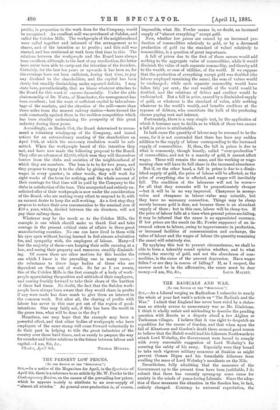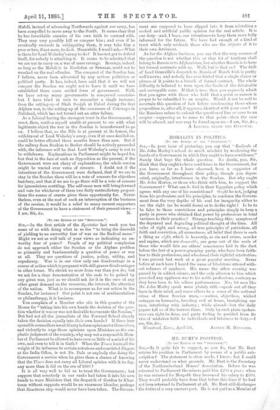THE RADICALS AND WAR.
ITo THE EDITOR OF THE " SPECTATOR."]
Sat,—As a Liberal verging on Radicalism I subscribe to nearly the whole of your last week's article on " The Radicals and the War." I admit that England has never been ruled by a statesman so utterly averse to unnecessary war as Mr. Gladstone. I think it wholly unfair and misleading to describe the pending question with .Russia as a dispute about a few Afghan or Turkoman villages. I believe that it was right to despatch an expedition for the rescue of Gordon, and that when upon the fall of Khartoum and Gordon's death there seemed good reason to believe that the Mandi would lead his followers Northwards to attack Lord Wolseley, the Government were bound to comply with every reasonable suggestion of Lord Wolseley's for securing the safety of his army. Especially were they bound to take such vigorous military measures at Suakim as might prevent Osman Digna and his formidable followers from swelling the mass of Lord Wolseley's assailants on the Nile.
Nevertheless, fully admitting that the measures of the Government up to the present time have been justifiable, I do submit that there has recently sprung-up some cause for anxiety in the minds of peace-loving Liberals. Since the adoption of these measures the situation in the Soudan has, in fact, entirely changed. Contrary to universal expectation, the
Mandi, instead of advancing Northwards against our army, has been compelled to move away to the South. It seems clear that he has formidable enemies of his own faith to contend with. They may very possibly kill or conquer him ; and even if he eventually succeeds in subjugating them., it may take him a year or two, if not more, to do it. Meanwhile, I would ask,—What is there for Lord Wolseley's army to do ? It has not got to defend itself, for nobody is attacking it. It seems to be admitted that we are not to carry on a war of mere revenge. Revenge, indeed, as long as the Mandi is in Kordofan or Sennaar, could not be wreaked on the real offender. The conquest of the Soudan has, I believe, never been advocated by any serious politician or political party. It has, indeed, been said that if we will not conquer the Soudan we ought not to leave it until we have established there same settled form of government. Well, we have set-up many governments in conquered countries, but I have tried in vain to remember a single instance, from the setting-up of Shah Soojah at Cabul during the first Afghan war, to the setting-up of the successors of Cetewayo in Zululand, which has not turned out an utter failure.
As a Liberal having the strongest trust in the Government, I must, then, confess myself unable at present to see with what legitimate object the war in the Soudan is henceforward to go on. I believe that, as the Nile is at present at its lowest, the withdrawal of Lord Wolseley's army, even if at once decided on, could be better effected three months hence than now. But if the railway from Suakim to Berber should be actively proceeded with, the inference will be that Lord Wolseley's army is not to be withdrawn. Explanations in Parliament might be hoped for, but that in the face of such an Opposition as the present, if the Government were not chary of explanations, the whole session might be wasted over votes of censure. I doubt not if the intentions of the Government were declared, that if we are to stay in the Soudan there will be a vote of censure for objectless butchery, and that if we are to go there will be a vote of censure for ignominious scuttling. The self-same men will bring forward and vote for whichever of these two flatly contradictory propositions the course of events gives them opportunity for. Nevertheless, even at the cost of such an interruption of the business of the session, it would be a relief to many earnest supporters of the Government to have a statement of their present views.—
I am, Sir, &c. M.



































 Previous page
Previous page